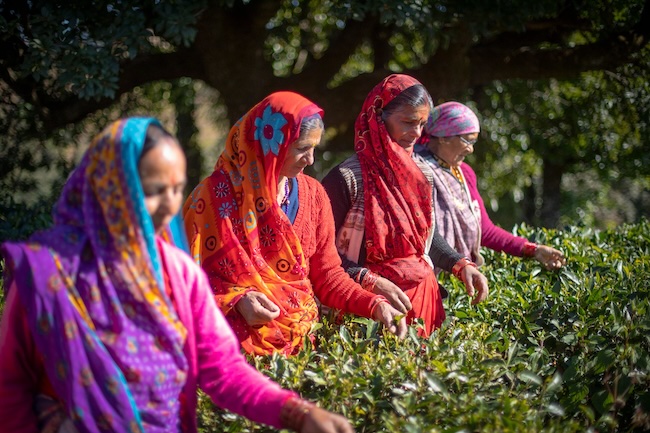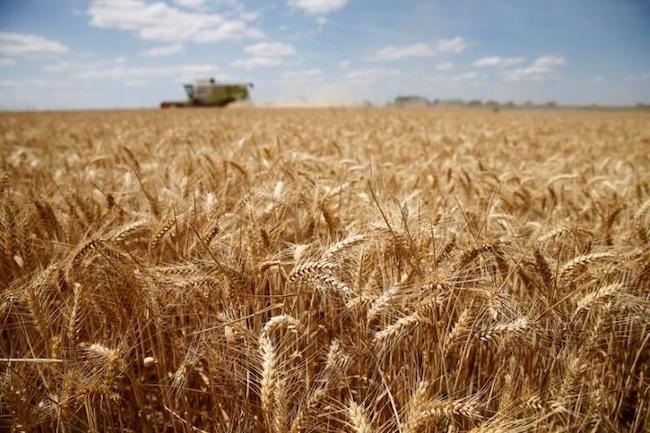
Why Some Organic Brands are Getting an Early Start on ESG Reporting
(Through a partnership with USAID Cooperative Development Program, Frontier Co-op is helping build a new tea processing facility that will be owned by tea farmers in this rural Himalayan region of Kumaon, India. Photo courtesy of Frontier Co-op.)
How Organic Insider operates: We accept no advertising, we have no paywalls and we make our newsletters free to everyone because vital information about our industry needs to get out to as many people as possible. Please consider supporting our work, whether you are an individual or a company. Thank you so much.
ESG reporting has the ability to level the playing field when it comes to measuring a company’s activities and impact in the marketplace and against its competition.
While it is still early, not to mention the controversy it has garnered in the media, the growing importance of these metrics cannot be ignored.
“ESG disclosures are coming like a freight train as a regulatory requirement, and no one will escape this, including venture-capital backed, private organic brands,” said Elisa Turner, founder and CEO of Impakt IQ, an ESG compliance and intelligence firm.
Goldman Sachs said that “integrating ESG into asset managers’ portfolios is becoming a business imperative,” and according to a study from McKinsey and NielsenIQ, there is a fact-based case for CPG companies bringing environmentally and socially responsible products to market.
Amid pushback from corporations who do not want to report their direct and indirect carbon footprint, the U.S. Securities and Exchange Commission is expected to finalize its climate change disclosure rulemaking this spring.
However, governments around the world have hardly been been waiting for the U.S. to act.
* In 2023, the International Sustainability Standards Board (ISSB), which is led by former Danone CEO Emmanuel Faber, issued its inaugural global sustainability disclosure standards.
What makes the ISSB so unique and gives it such gravitas is that the organization behind it is the International Financial Reporting Standards Foundation (IFRS). In the early 1970s, the IFRS created the International Accounting Standards Board, whose standards are currently being used by over 140 countries worldwide, including 15 of the G20 countries.
* Last July, the European Commission adopted the first set of European Sustainability Reporting Standards.
* A few months ago in California, the state passed ESG disclosure laws for companies with over $1 billion in revenues.
REAPING THE BENEFITS
A handful of very progressive organic brands have started to embrace ESG reporting, and below are a few reasons why they have done so or how they have benefitted from it.
1. Major retailers are starting to demand this information.
Amazon will soon require suppliers to report their carbon emissions data to the company and to set emissions reduction goals. Thrive Market started supplier engagement last year and is currently in the “requesting data” phase.
Also, in an email obtained by Organic Insider, a category manager at a leading natural supermarket chain sent out a request to his suppliers asking, among other questions, the following:
– What exactly is the carbon footprint of your product?
– How does that compare to other products in the category?
– Which ingredient has the highest impact?
– What is the impact of your product on biodiversity?
– What are the human rights risks in the ingredients of your products?
Frontier Co-op, an organic spice, herb and botanical products company in Iowa, has been an early adopter of this new dynamic in the marketplace.
“We undertook an ESG assessment because we felt it was our responsibility to ensure we’re collecting our ESG data in a way our business partners need for their Scope 3 reporting,” put forth Alicia Simmons, sustainability manager at the company. Scope 3 reporting includes indirect emissions that occur in the upstream and downstream activities of an organization.
2. Gives them an edge when raising money.
For Reginaldo Haslett-Marroquín, CEO of Tree-Range® Farms, a regenerative organic chicken producer in Minnesota, having completed an ESG report and implementing a strategy based on those results made a big difference when soliciting investors.
“This immediately put us above other companies seeking money and greatly helped in landing our lead investor. It completely changed the conversation.”
For WM Partners, a private equity firm that invests in health & wellness, ESG is an essential consideration.
“When looking at an investment, our ESG group does due diligence — as we would for other areas — to identify risk and opportunity, and we will not go to the investment committee without the ESG scorecard filled out,” said Ernesto Carrizosa, managing partner and CIO at the fund. “If we are evaluating two companies and one has ESG upside and the other one doesn’t, that will impact the decision-making process.”
3. Makes their companies strategically stronger and reduces their operational risk.
Even though some may view an ESG assessment as a perfunctory activity to keep investors and suppliers content, it has proven to be much more than that.
“Having this ESG report not only informed our leadership’s strategic planning, but we believe it will help us continue to compete with larger public multinational companies, by providing our customers the same level and quality of ESG data and assurance,” added Frontier Co-op’s Alicia Simmons.
Reginaldo Haslett-Marroquín of Tree-Range® Farms also realized tremendous benefit to his business.
“The ESG process cleared everyone’s head as to where to focus our energy and enabled us to come up with new management strategies. We are now operating at a competitive advantage and have significantly de-risked the business. As an investor myself, that is what I would like to see in future food systems.”
Impakt IQ’s Elisa Turner, whose firm provided ESG reports to these two companies, believes in its importance as a crucial business intelligence tool.
“90% of the value of a company is attributable to intangible assets, which bump up directly against ESG — risks such as climate, geopolitical, biodiversity, HR and cybersecurity. Investors and business leaders need insight into these risks, and it’s up to each organic brand to decide whether they want to be proactive or reactive.”
 |
With gratitude, 
Max Goldberg, Founder |
Quick Hits
* The ‘Forever Chemical’ Scandal, a documentary about PFAS from Bloomberg.
* The city of Laguna Beach, CA is ending its use of the toxic weedkiller glyphosate.
* The Future of Wellness from McKinsey & Co.
* Why Patagonia is getting into the beer business.
* Rodale Institute and Propagate announced a new partnership to promote agroforestry and tree crop systems in North America.
* Terra Thread, a Regenerative Organic Certified® bag and apparel company, is now on Urban Outfitters.
* Richman Law & Policy, a firm very active in protecting consumers and our food supply, has released its 2023 Impact Statement.
* Organic Valley is paying its farmers to reduce their carbon footprint.
* GreenScreen Certified validates that packaging is free from PFAS.
* Sun+Earth, a third-party certification for regenerative cannabis, has just certified its first farm on the East Coast — Rebel Grown in Vermont.
* In a surprising and very disappointing twist, Mother Jones has taken a sympathetic view of GMOs.
New Organic Products
Protein Shakes from Suja Organic
Suja Organic has just introduced Protein Shakes, a new line of elevated ready-to-drink protein that is blended with almond milk and coconut cream. They come in three flavors -- chocolate, coffee bean and vanilla cinnamon -- and each offers 16g of plant-based pea, rice and hemp protein. Now available nationwide in Target stores and on target.com.Pops from Daily Harvest
Pops from Daily Harvest are the brand's first-ever collection that's geared toward children. With less than eight grams of non-refined sugar and six or fewer ingredients per serving, these USDA certified organic fruit-and-veggie-packed ice pops come in three flavors -- strawberry + dragon fruit, mango + passion fruit and blueberry + banana. Now available on the company's website and coming soon to grocery stores.Superfood+ Sea Veggie Blend from Navitas Organics
The Superfood+ Sea Veggie Blend from Navitas Organics contains three varieties of seaweed -- rockweed, sugar kelp and skinny kelp, all of which are hand-harvested and grown regeneratively in the North Atlantic. USDA certified organic, gluten-free and third-party tested, the powder has no added sugar, fillers or fortified ingredients.Sipjoy Probiotic Seltzer from Brew Dr.
After two years of development, kombucha brand Brew Dr. has just introduced Sipjoy, a line of organic probiotic seltzers. They come in four flavors -- lemonade & tea, grapefruit, lime and orange -- and each contains 5g of cane sugar, gut-friendly probiotics and 25 calories per serving. Available nationwide at Sprouts Farmers Market.
Weekly News Summaries


American Academy of Pediatrics advises to Avoid GMO Foods
A new clinical report issued by the largest professional association of pediatricians in the U.S. focuses on the risks of the herbicides sprayed on GM food and feed crops – especially glyphosate.

USDA Awards $9.75 million in Organic Market Development Grants
These grants will provide information and services to more than 20,000 producers and 20,000 buyers to increase market opportunities for organic farmers.

Prop 65 Lawsuits Against Food and Beverage Companies Have Been Spiking
By Elizabeth Crawford
Heavy metal contamination, notably lead, has dominated Prop 65 cases.


Rep. Chellie Pingree introduces Bipartisan Bill to Support Organic Dairy Farmers
The Organic Dairy Data Collection Act would enhance data collection at the USDA to better understand the costs associated with producing organic milk.

Arizona and Florida Seek to Ban Lab-Grown Meat
By Keith Nunes
Legislators in these states cite food safety concerns as one reason for the proposed ban -- and rightly so.

USDA Report Examines Growth of Organic Over the Past 20 Years
The most telling sentence of the report was "With U.S. consumer demand for organic food growing faster than certified organic acreage, an extensive organic trade sector also emerged." Meaning, instead of the U.S. making domestic organic production a priority, we have sent these farming jobs offshore.


Study: Glyphosate May Be Responsible for Wheat Intolerance
Clinical trials have shown that gluten from wheat is not responsible for causing symptoms in healthy individuals, suggesting that something else -- possibly glyphosate -- is inducing symptoms.
EU Parliament’s Environmental Committee Supports Relaxing Rules on Gene-Edited Plants
By Samuel Petrequin
GMO 2.0 plants need more regulation, not less. A worrisome development.

USDA: 'We Will Need Cellular Agriculture' to Reach Climate, Food Innovation Goals
By Deniz Ataman
Our tax dollars and food policies should be favoring regenerative organic agriculture instead of risky and unproven GMO 2.0 technologies.
Want to share this newsletter on social media? You can use this link: Newsletter Link
The material in this newsletter is copyrighted and may be reprinted by permission only. All requests must be in writing. Please use our contact form to request republication rights.
Newsletter Archive
Quick Hits
* The ‘Forever Chemical’ Scandal, a documentary about PFAS from Bloomberg.
* The city of Laguna Beach, CA is ending its use of the toxic weedkiller glyphosate.
* The Future of Wellness from McKinsey & Co.
* Why Patagonia is getting into the beer business.
* Rodale Institute and Propagate announced a new partnership to promote agroforestry and tree crop systems in North America.
* Terra Thread, a Regenerative Organic Certified® bag and apparel company, is now on Urban Outfitters.
* Richman Law & Policy, a firm very active in protecting consumers and our food supply, has released its 2023 Impact Statement.
* Organic Valley is paying its farmers to reduce their carbon footprint.
* GreenScreen Certified validates that packaging is free from PFAS.
* Sun+Earth, a third-party certification for regenerative cannabis, has just certified its first farm on the East Coast — Rebel Grown in Vermont.
* In a surprising and very disappointing twist, Mother Jones has taken a sympathetic view of GMOs.




